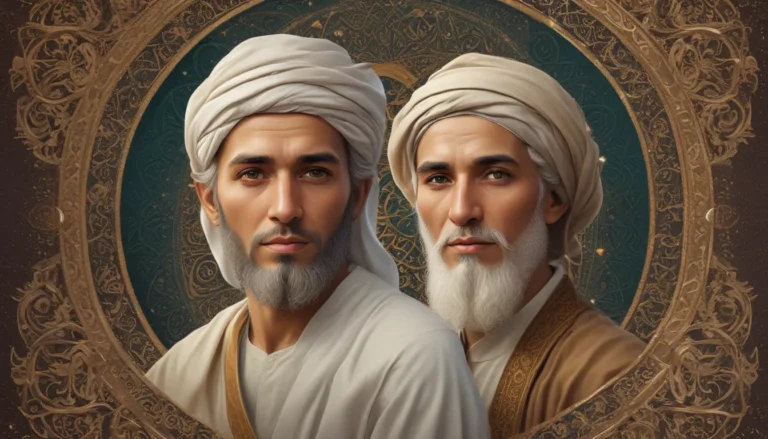The images in our articles may not match the content exactly. They are used to grab your attention, not to show the exact details in the text. The images complement the text but do not replace it.
Welcome to the fascinating world of Theosophy, a spiritual philosophy that delves into the depths of divine wisdom and the mysteries of the universe. From its roots in ancient traditions to its influence on modern spirituality, Theosophy offers a unique path to understanding the nature of reality and the purpose of life. In this comprehensive guide, we will explore 14 intriguing facts about Theosophy that will enlighten and inspire you on your spiritual journey. Whether you are a seasoned practitioner or a curious seeker, come with us as we unravel the mystical secrets of Theosophy.
Unveiling Divine Wisdom: The Essence of Theosophy
At the core of Theosophy lies the pursuit of spiritual knowledge and the exploration of divine mysteries. The very word “Theosophy” itself, derived from the Greek words “theos” meaning “god” and “sophia” meaning “wisdom,” encapsulates the essence of this profound philosophy. It invites seekers to embark on a quest for deeper understanding and enlightenment, unlocking the secrets of the universe and the soul.
Helena Blavatsky: The Trailblazer of Theosophy
Helena Petrovna Blavatsky, a renowned Russian occultist and writer, stands as the visionary founder of Theosophy. Through her groundbreaking works, most notably “The Secret Doctrine,” Blavatsky laid the foundation for modern Theosophical teachings, weaving together Eastern and Western philosophies to create a comprehensive worldview that continues to inspire spiritual seekers worldwide.
The Three Pillars of Theosophy: Eternal Truths That Guide the Way
Central to Theosophy are three fundamental principles that serve as the bedrock of its teachings:
- The belief in an eternal, impersonal divine intelligence that pervades all existence.
- The concept of reincarnation, wherein the soul evolves through multiple lifetimes to attain higher levels of consciousness.
- The existence of spiritual masters or adepts who illuminate the path of humanity’s spiritual evolution and offer guidance to seekers on their journey of self-discovery.
Bridging Past and Present: The Influence of Theosophy on Modern Spirituality
Theosophical concepts have left an indelible mark on various spiritual and philosophical movements, shaping the landscape of modern spirituality. From the New Age movement to esoteric Christianity, the teachings of influential figures like Rudolf Steiner and Alice Bailey bear the imprint of Theosophy’s timeless wisdom, resonating with seekers seeking deeper truths and greater unity.
The Beacon of Light: The Theosophical Society’s Legacy
Founded in 1875 by Helena Blavatsky, Henry Steel Olcott, and William Quan Judge, the Theosophical Society stands as a beacon of wisdom and exploration for seekers around the globe. With branches spanning the continents, the Society provides a platform for the study and dissemination of Theosophical teachings, nurturing a community of like-minded individuals dedicated to spiritual growth and enlightenment.
Ascended Masters: Guiding Lights on the Path of Evolution
Central to Theosophy is the belief in Ascended Masters, enlightened beings who have transcended the limitations of the material world to guide humanity towards greater spiritual evolution. These masters, revered for their wisdom and compassion, offer seekers profound insights and transformative knowledge, illuminating the way towards higher realms of consciousness.
Delving Into the Akashic Records: The Library of Cosmic Wisdom
According to Theosophy, the Akashic Records serve as an ethereal repository of the collective knowledge and experiences of humanity. Accessible through deep meditation and spiritual practices, these cosmic archives offer seekers a window into the past, present, and future, unveiling hidden truths and insights that can illuminate the path of self-discovery.
The Law of Karma: The Cosmic Dance of Cause and Effect
Central to Theosophy is the Law of Karma, which posits that every action, thought, and intention has consequences that reverberate throughout the cosmos. By recognizing the interconnectedness of all beings and the cyclical nature of deeds, individuals are called upon to navigate the web of karma with mindfulness and integrity, shaping their destinies through conscious choices and deeds.
The Seven Rays: Illuminating the Spectrum of Divine Energies
In Theosophy, the concept of the Seven Rays serves as a framework to understand the diverse qualities and energies present in the universe. Each individual is believed to resonate with a predominant ray that influences their personality, spiritual path, and evolutionary journey, offering insights into their unique gifts and challenges on the path towards self-realization.
Embracing Global Unity: The Universal Brotherhood of Humanity
At the heart of Theosophy lies the vision of global unity and brotherhood, transcending boundaries of race, religion, and nationality to embrace all beings as interconnected facets of the divine. Encouraging a spirit of compassion, understanding, and respect, Theosophists strive to cultivate harmony and unity in a world divided by differences, embodying the timeless truth of universal love and solidarity.
The Hierarchical Cosmos: A Ladder of Spiritual Evolution
Theosophy delineates a hierarchical structure in the spiritual realms, wherein beings progress through different levels of consciousness and spiritual development. From angels and devas to ethereal entities beyond human comprehension, the cosmos teems with diverse beings and intelligences, each playing a vital role in the grand tapestry of creation.
Echoes of the East: The Eastern Influence on Theosophical Teachings
Drawing inspiration from Eastern philosophies and spiritual traditions, Theosophy weaves together the tapestry of Hinduism, Buddhism, Taoism, and other ancient wisdom traditions to offer a holistic view of the universe and human existence. Bridging the gap between East and West, Theosophy invites seekers to explore the rich tapestry of spiritual insights and transformative practices that lie at the heart of Eastern wisdom.
The Path of Self-Realization: Awakening the Inner Divinity
Central to Theosophy is the path of self-realization, wherein individuals are called upon to explore their inner selves, expand their consciousness, and cultivate a profound connection with the divine. Through spiritual practices, self-reflection, and inner work, seekers embark on a transformative journey of awakening, unlocking the dormant potentials of the soul and aligning themselves with the cosmic dance of creation.
The Ever-Evolving Tapestry of Theosophy: Nurturing Ancient Wisdom in the Modern Age
As Theosophy continues to evolve and adapt to the changing currents of the modern world, contemporary Theosophical organizations and seekers strive to make these ancient wisdom teachings accessible and relevant for today’s spiritual seekers. By blending tradition with innovation, Theosophy remains a vibrant and dynamic spiritual path that offers seekers a roadmap to enlightenment and self-discovery in the 21st century and beyond.
Embracing the Mystical Tapestry: The Profound Legacy of Theosophy
In conclusion, Theosophy stands as a testament to the enduring power of spiritual wisdom and the timeless quest for enlightenment. With its emphasis on divine knowledge, global unity, and self-realization, Theosophy invites seekers to delve into the depths of the soul and the cosmos, unlocking profound insights and transformative experiences along the way. As we journey through the 14 facts about Theosophy, we uncover a treasure trove of spiritual insights and mystical secrets that promise to illuminate our path and inspire our hearts.
FAQs
Q: What is Theosophy?
A: Theosophy is a spiritual and philosophical movement that explores the nature of reality, divine wisdom, and the purpose of life through an integrative worldview that combines Eastern and Western philosophies, religion, and science.
Q: Who founded Theosophy?
A: Theosophy was founded by Helena Petrovna Blavatsky, a Russian occultist and writer who revolutionized spiritual thought in the late 19th century with her groundbreaking works and teachings.
Q: What are the key principles of Theosophy?
A: Theosophy is built upon principles such as the belief in a universal divine intelligence, the concept of reincarnation, and the existence of spiritual masters who guide humanity’s evolution. It also emphasizes global unity, self-realization, and the exploration of ancient wisdom traditions.
Q: Is Theosophy a religion?
A: Theosophy is not considered a religion but rather a spiritual philosophy that welcomes individuals of diverse religious backgrounds to explore universal truths, spiritual growth, and self-realization.
Q: How does Theosophy view the concept of God?
A: Theosophy perceives God as an all-encompassing, eternal, and infinite force that transcends human understanding. It acknowledges the existence of multiple spiritual hierarchies and divine beings who guide the evolution of the cosmos.
Q: Can anyone practice Theosophy?
A: Yes, Theosophy is open to anyone who is interested in expanding their consciousness, exploring spiritual truths, and embarking on a journey of self-discovery and inner growth. It welcomes seekers from all walks of life to delve into the mysteries of existence.
Q: Are there specific practices associated with Theosophy?
A: Theosophy does not prescribe specific practices or rituals but encourages individuals to engage in self-study, meditation, contemplation, and self-reflection as a means to deepen their understanding, expand their consciousness, and forge a deeper connection with the divine.
Q: How can Theosophy benefit individuals?
A: Theosophy offers individuals a framework for understanding life’s purpose, cultivating harmony and unity with all beings, and pursuing personal growth and spiritual evolution. It provides insights, wisdom, and practices that can inspire transformation and enlightenment on the path of self-realization.
Q: Is Theosophy widely practiced worldwide?
A: While Theosophy may not have the same widespread following as mainstream religions, it has influenced various spiritual movements, individuals, and organizations around the world. Its teachings and principles continue to resonate with seekers seeking deeper truths and greater spiritual insights.
Q: Who are some notable figures associated with Theosophy?
A: In addition to Helena Blavatsky, prominent figures in Theosophy include Annie Besant, William Quan Judge, and Charles W. Leadbeater, whose contributions have enriched and expanded the legacy of Theosophical teachings and practices.
Embark on the Quest for Spiritual Enlightenment
As you journey through the realm of Theosophy, may you find inspiration, wisdom, and profound insights that illuminate your path and elevate your consciousness. Whether you are a seasoned seeker or a curious explorer, the mysteries of Theosophy await, inviting you to delve into the depths of existence and unlock the hidden truths that lie within. Embrace the timeless legacy of divine wisdom, global unity, and self-realization as you embark on a transformative quest for spiritual enlightenment and personal growth. Theosophy holds the key to unlocking the mysteries of the universe and the soul, guiding you towards a deeper understanding of the interconnected nature of all existence. Indulge in the rich tapestry of spiritual insights and mystical secrets that Theosophy has to offer, and may your journey be filled with illumination, inspiration, and boundless wisdom.






